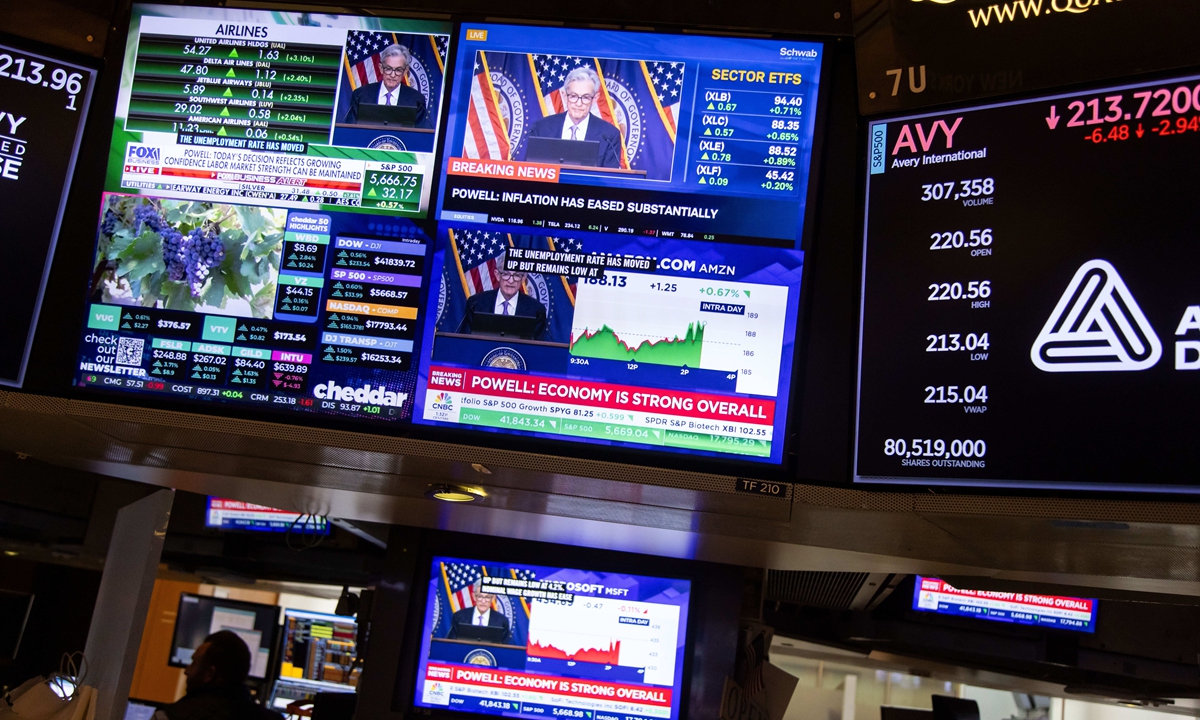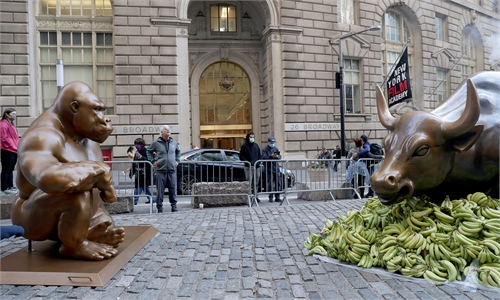US rate cut unlikely to have major impact on China: experts
China to remain focused on ensuring steady economic growth: experts

Television stations broadcast Jerome Powell, chairman of the US Federal Reserve, speaking after a Federal Open Market Committee meeting on the floor of the New York Stock Exchange in New York on September 18, 2024. The Federal Reserve lowered its benchmark interest rate by a half percentage point on the day. Photo: VCG
The US Federal Reserve's decision to cut interest rates for the first time in four years is unlikely to have a major impact on China's ongoing economic growth and market stability, as the world's second-largest economy remains on a growth track with a slew of policy measures set to further boost the rebound, Chinese economists said on Thursday.While the precise impact of the US Fed's move on the global economy remains to be seen, the rate cut, which is aimed at stabilizing the US economy, in theory is generally positive for the world economy, as it would offer room for other economies to cut rates to boost growth, economists noted. Yet, they also cautioned over potential fluctuations in the global economy and markets caused by major policy shifts.
Following weeks of speculation, the US Fed on Wednesday US time announced a cut of its benchmark interest rate by 0.5 percentage point. The move has drawn widespread attention from around the world, given the potential impact of policy changes in the US on the global economy, which faces a series of challenges.
Significantly, the US rate cut on Wednesday is widely considered to be a start of a rate-cutting cycle in the US, which could have a profound global impact, given the critical role the US economy and its currency could have played in the global economy. However, the precise impact remains to be seen, economists said.
Xu Hongcai, deputy director of the China Association of Policy Science's Economic Policy Committee, said that the future US moves and their impact require further observation, but generally speaking, the move is positive for the world economy. "The US Fed's interest rate cut is expected to stimulate the US stock market and US consumption, which is good news for the global economy and also good news for China's exports," Xu told the Global Times on Thursday.
In addition to boosting the US economy, the Fed's move could also create room for other countries to cut rates. While some major economies, including those in the eurozone, the UK and Canada have already cut rates, other countries, including emerging markets, could also move to cut rates to boost growth, according to economists and media reports.
"In terms of impact, the US Fed's rate cut will open up room for central banks in various countries to lower interest rates, which will lead to a shift toward monetary easing globally," Yang Chang, chief analyst of Zhongtai Securities, told the Global Times on Thursday, noting that some economies have already announced rate cuts following the US move.
Impact on China
For the Chinese economy, lower US interest rates could mean lower pressure on the yuan's exchange rate and increased attractiveness of yuan assets due to interest rate differentials, the economists said.
"Declining returns on US dollar assets due to the rate cut, coupled with China's long-term development prospects as well as the attractiveness of the undervalued yuan assets, will likely help attract the inflow of global capital, which is conducive to the domestic financial market and economic development," Zhou Maohua, an economist at China Everbright Bank, told the Global Times on Thursday.
In addition, the US' rate cut could also indirectly open up more room for monetary easing to boost market confidence in the economic growth, Zhou said, noting that the growth will continue steadily and there are strong fundamentals for the stability of the yuan's exchange rate.
Still, the US Fed's move is unlikely to have a major impact on China's economy, as Chinese policymakers have already implemented various policies to boost the country's economic growth, according to economists.
Analysts also warned of potential risks from major fluctuations in overseas economies and markets caused by the major shift in US monetary policy. "There are risks from policy shifts overseas and economic fluctuations," Yang said.




